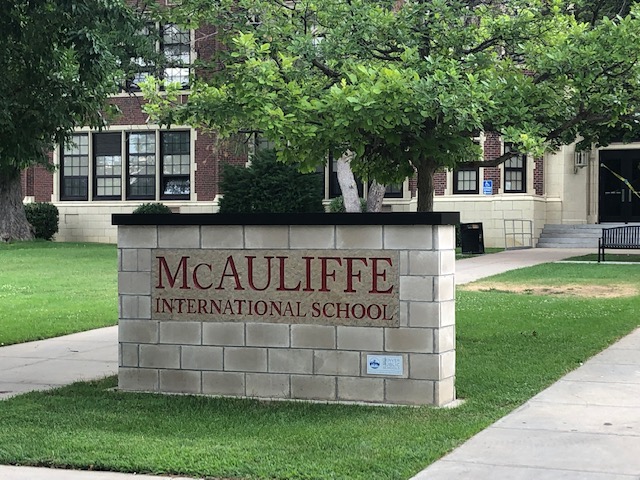The Denver Public Schools new mandated later start times for secondary schools is costing McAuliffe International students an hour per day of core curriculum instruction and forcing the school to spend thousands on teacher supervision as parents continue to drop off their students an hour before the new formal start of the day.
Under what’s known as Healthy Start Times, middle and high schools are not allowed to begin the day before 8:20 a.m. To accommodate bus schedules, McAuliffe must wait until 9:10 a.m. to open its classroom doors. Approximately 12% of the school’s 1,500 students ride a bus.
Prior to the new requirement, McAuliffe started at 8 a.m. and dismissed at 4 p.m. School now gets out at 4:10 p.m. Letting out any later to regain the hour lost in the morning would present multiple logistical and family problems for students and teachers as they head out for sport and work activities, and to meet other after-school responsibilities.
However, many students are still arriving as early as 8 a.m. because parents must take them on their way to work or while taking siblings to other schools that start earlier. The school is having to offer enrichment classes and other supervision by teachers to ensure students are safe and monitored properly. That staffing is running upwards of $10,000 a year, at a minimum.
“We’ve got to deal with what our community is doing,’’ says Colleen O’Brien, executive director of the Northeast Denver Innovation Zone of which McAuliffe is a member.
But that morning instruction is not in core subjects. Cumulatively, that daily lost hour comes to roughly 185 hours or more than 20 school days.
McAuliffe, an innovation school, a status that gives it certain freedoms from district rules, has requested a waiver from the Healthy Start Times format. The district has refused, despite state law that permits an innovation school to set its own hours.
“This is one of the sticking points (the lost hour of instruction) that the educators in the building really care a lot about,’’ O’Brien says. “They didn’t want to take that out (of the innovation plan). They said it was foundational to their programming.’’
Research and time-test practices have clearly shown that the more time devoted to teacher instruction, the better the student achievement.
“Expanded learning time can raise achievement by ensuring students have more individualized learning time,” says the National Center on Time and Learning, a Boston-based organization that’s been working on expanding learning time nationally for nearly 20 years.
“Not only does more time allow for longer class periods in which students can examine topics in greater depth and in varied ways (e.g., not only dissecting a text, but also acting it out),” the NCTL says, “but expanded-time schools are also able to set aside whole periods each day to focus on small-group interventions to address and overcome student learning deficits. . . .
“More time also helps to ensure the inclusion of the critical classes that too often have been scaled back, such as science, social studies, and foreign languages.”
The DPS Board of Education passed a Healthy Start Times resolution in May 2021 for all middle and high schools (district-managed and charters) to start no earlier than 8:20 a.m. The board cited research-backed benefits of more than eight hours of sleep per night for adolescents:
- Better attendance rates.
- Better academic outcomes.
- Higher graduation rates.
- Fewer instances of depression.
- Reduced caffeine use.
- Fewer car accidents.
- Better physical and mental health overall.
McAuliffe submitted its innovation plan with the 8 a.m. start 18 months ago, but the district has yet to fully review it. The board may take up the plan at its Nov. 16 meeting or in December, but nothing has been formally scheduled.
The district’s public information office did not respond to questions about McAuliffe’s plan by the time this story was posted. CPEdNews also reached out to DPS Board member Michelle Quattlebaum, whose district includes Central Park, but she also had not responded. CPEdNews will update the story when it receives any information from the district or Quattlebaum.
O’Brien stressed that the school wants to accommodate students who ride buses, and she is very aware that the transportation department is restricted by too few drivers and routes.
She says the school knows it needs to be flexible year-to-year – to a point. “We just want the extended school day.”
Impact of Healthy Start Times on Instructional Time
O’Brien offered this summary of the impacts of Healthy Start Times.
In our planning, we consider both the needs of families who bring their children to school before 9 a.m. and the needs of families who ride the bus. Last week (Oct. 23-27) the educators at McAuliffe asked DPS for an extension on the review of the plan so we can come to an agreement on this issue of use of time.
Before Healthy Start Times: From 2012 to Spring of 2021 (179 Student Contact Days)
- McAuliffe bell times – 8 a.m. – 4 p.m.
- 5 period day (80 minutes each).
- 400 student instructional minutes or 71,600 minutes a year.
After Healthy Start Times: 2022-23 School Year (175 Student Contact Days)
- McAuliffe bell times – 9:10 a.m. — 4:10 p.m.
- 4 period day (85 Minutes Each).
- 340 student instructional minutes or 59,500.
- Students less 12,100 instructional minutes a year in core subjects.
- Student enrichments (Mon. –Thurs. 8 to 9 a.m.).
O’Brien suggested concerned parents should consider supporting their school by getting involved in the NDIZ Community Council. It’s most recent meeting was Wednesday, Nov. 8, at 5:30 p.m., at Swigert International, another NDIZ school, at 3480 Syracuse St.
For more information contact Colleen O’Brien at Colleen@NDIZ.org to join the Zone Community Council.
(The Foundation for Sustainable Urban Communities awards grants to Central Park schools, including McAuliffe.)




